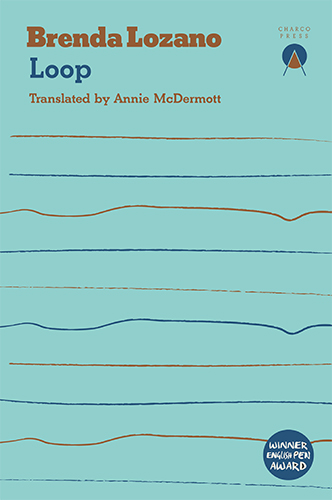
Loop
by Brenda Lozano; translated from the Spanish by Annie McDermott
Charco Press, 2021
184 pages, £9.99
What does it mean to write a book that makes no play for importance, that puts no value on what people think? The unnamed narrator of Brenda Lozano’s beguiling novel Loop raises such a question from the outset. “In this city,” she observes from the periphery of a Mexico City gallery opening, “we could form a cult around [importance].” The narrator is only mildly bothered by her apparent insignificance, on the periphery of a gallery opening while “The Most Important Artist in Mexico” dances cumbias in the middle of the floor. She has a boyfriend, Jonas, and with him everything is in its place. She describes this in terms of a ratio, a 1:1 relationship. We can imagine this balance in terms of height or intelligence or social standing, but whatever it means they crack jokes and have good sex. This is enough for them.
This balance is thrown into disarray, however, when Jonas leaves for Spain after the death of his mother. Loop, originally titled Cuaderno Ideal, is framed as a journal account of his absence. This is, as a form, a precarious place for a novelist as well as a character. History is a bloodbath. The polar bears are drowning, while in Lozano’s home country thousands of women are murdered without redress, and you miss your boyfriend? This is just the reaction Lozano wishes to elicit I think. How do we reconcile the intimacy of the unimportant everyday with the magnitude of global importance?
As Loop proceeds in its spiraling meditative fashion, the question of scale keeps reappearing. We dismiss the minor but we also can’t grasp the vast, so what does that leave us with? Lozano poses the question like this:
This morning I read something strange. From my taxi, I read in the window of an occult shop: ‘Love makes the ideal real.’ I disagree with that window: love doesn’t make the ideal real. On the contrary, reality sends us in search of ideals. There’s no reverse gear, no opposite direction.
You know what? The government of this country isn’t ideal. I read a strange fact about Ancient Greece: the statue of Zeus at Olympia was twelve meters tall. The Lighthouse of Alexandria was one hundred and thirty-four meters tall. A building in Mexico City would easily be that tall, or taller. So how tall should the statue be of the president who’s left this country with such a horrific death toll?
The wonders of the ancient world, notable for their grandeur, are insignificant compared to an average building now. At the same time, femicides in Mexico, which occur with little investigation or even acknowledgement, rival half the population of Plato’s Athens. What does this say about our attention, or what we give value to?
The question extends particularly to the artist. Lozano’s narrator wonders what these deaths mean to ‘The Most Important Artist in Mexico,’ or to her as she writes her notebook of longing. She knows she doesn’t want to end up like ‘the writer with a grant,’ like the one the narrator sees on television:
Positively beaming he said to the interviewer through purplish lips: ‘This novel is about death in every respect, and my God, writing it is killing me!” I didn’t believe him. You can just tell that the worst thing to happen to this writing in his thirty-something years—aside from a split condom one of the times he’s probably cheated on his wife—is missing a flight.
This is the excess subjectivity Lozano’s narrator fears might take hold in her “ideal notebook.” And so, to tap a classical reference as Lozano is fond of doing, the 90,000 murdered women whose lives and desires are null and the single privileged artist whose life and desire is grandiose serve as the Scylla and Charybdis through which the narrator must thread her own story.
The juxtaposition of the important artist and the numerous faceless victims may remind certain readers of an important doorstopper of a novel set in Mexico. Viewed from this perspective, Loop serves as a corrective to Roberto Bolaño’s 2666 and succeeds in 200 pages in ways that Bolaño’s 900 pages make impossible. Again, it is a question of scale. If 2666 demonstrated the intractable systems of commerce, of interpretation, and of brutality through its length, then Loop shows the possibility of change through intimacy and community. Through her friends and some unforeseen twists, Lozano’s narrator comes to see “The more useless something is, the more subversive.” The intimate space she creates, which she constructs and unravels over the course of the novel, is itself sufficient.
This is not a work that represents the irreducible violence of the place, solves loneliness, or is about death in every respect, but rather an attempt to live with these realities and still miss your boyfriend. Lozano’s protagonist takes this for a contradiction at the novel’s outset, but by the end she asserts: “unlearning yourself is more important than knowing yourself.” Loop arrives when we have all been asked to reassess ideas of control we had over our lives; reading it is both a comfort and a provocation.
